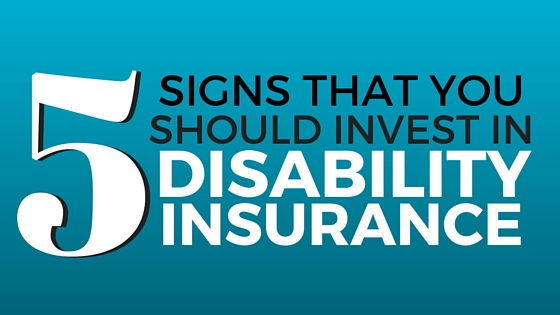5 Signs You Should Invest In Disability Insurance

Download this episode:
On iTunes | On Stitcher
Are you thinking about purchasing disability insurance? There are many factors to consider, but there are five signs that may indicate you should invest in a policy.
#1: You have many monthly expenses to cover.
If you are unable to work due to a disabling illness or injury, do you have enough savings to cover your monthly expenses? How long will those savings last you?
Financial difficulties would set in for half of working Americans after only one month. If you have a lot of monthly expenses and a limited amount of savings, it may be time to consider a long term disability insurance policy.
#2: You have dependents who count on your income.
Caring for others can be costly. If you have a child, spouse or elderly parent who also relies on your income, the need for disability insurance increases.
According to the USDA, the average cost of raising a child born in 2013 up until age 18 for a middle-income family in the U.S. is $245,340 (or $304,480, adjusted for projected inflation). The average price of a stay in an assisted living facility is $43,200.
Without the security of disability insurance, you may find it difficult to continue providing the same level of care and support to your loved ones.
#3: You’ve invested time and money into your professional skills and career.
If you have invested heavily to become a highly trained specialist in your field, you should also invest in a rock-solid disability insurance policy to protect your income.
An own-occupation rider is also a must for high earners. This will allow you to collect benefits if your disability prevents you from performing the duties of your own occupation, even if you can perform an alternate occupation.
RELATED: 10 Mistakes To Avoid In Individual Disability Insurance Claims
It’s important to note that there is no universal definition of “own occupation,” so each insurance company will have its own interpretation of the term. The definition of own occupation may shift within the same policy based on the time period, too. Always review the policy carefully before purchasing and ask for clarification of confusing language.
#4: You worry about relying on government benefits to cover your needs.
Less than five percent of disabling accidents or illnesses are work-related, which means most aren’t covered by workers’ compensation.
Any concerns about relying on Social Security disability benefits to cover your expenses are reasonable. According to the nonprofit Life Happens, Social Security disability benefits only pay an average of $1,100 per month.
In order to replace as much as your income as possible, you’d need the protection of a disability insurance policy that pays 40-60% of your pre-disability gross salary.
#5: Your employer provides little to no disability benefits.
According to the Council for Disability Awareness, only 40% of employers offer short-term group disability benefits and only 33% offer long-term group disability insurance.
Even if you have some coverage through your employer, it might be wise to purchase an individual disability insurance policy. Employer-sponsored policies often provide less coverage with more restrictions than a privately purchased policy.


